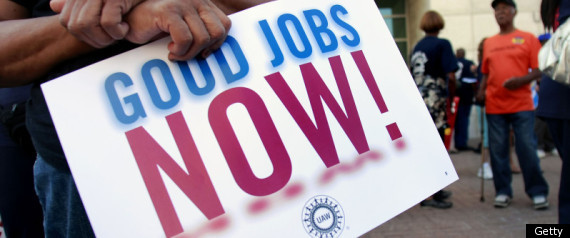The vast majority of Americans say labor unions raise wages and better working conditions, a new survey finds. Yet despite those benefits, Americans have almost never disliked them more.
Indeed, according to a Harris Interactive poll, more than seven in ten of those surveyed said labor unions are too politically-oriented and concerned "with fighting changes" as opposed to "bring[ing] about change." Still, over six in ten say labor unions also provide workers with better conditions and pay.
A Gallup poll also released Wednesday finds, more directly, that approval of labor unions has held at 52 percent, just above its lowest-recorded level going back to the Great Depression. Still, at 52 percent, the majority of Americans continue to support labor unions. The lowest recorded approval of labor unions was 48 percent in 2009, Gallup says.
Labor unions have become particularly politically polarizing in the last decade. While Democratic support of unions has held relatively steady since 1999 -- 78 percent of Democrats say they support labor unions -- the percent of Republicans supporting unions has plummeted to 26 percent from 51 percent, according to Gallup.
That diminishing approval can be in part explained by the 59 percent of those surveyed by Harris Interactive that say they disagree with the idea that unions help pass laws that help all workers, not just unions. Union members disagree, but not by much. Among union workers, 55 percent say unions pass legislation to help all workers, Harris Interactive says.
Between 1973 and 2007, union membership has dropped to 8 percent from 32 percent among men, according to The New York Times. A recent study found that decline in union participation accounted for roughly one-third of the increasing gaps in pay between the rich and poor.
In a weak economy, labor unions have been close scrutinized, especially in government. Wisconsin Governor Scott Walker earlier this year proposed a bill to limit labor unions' right to collective bargaining in the name of cutting government spending. Within the Union Auto Workers, disputes between union management and the rank-and-file has caused deepening rifts, as The Huffington Post reported in August.
Even larger unions are seeing their power tested. A recent strike by over 45,000 Verizon workers over pensions led by unions Communications Workers of America and International Brotherhood of Electrical Workers has been largely ineffective. Employees have returned to work after the two-week long strike, and as negotiations continue it's said that Verizon will likely win out on several key disputed issues.
Origin
Source: Huffington
Indeed, according to a Harris Interactive poll, more than seven in ten of those surveyed said labor unions are too politically-oriented and concerned "with fighting changes" as opposed to "bring[ing] about change." Still, over six in ten say labor unions also provide workers with better conditions and pay.
A Gallup poll also released Wednesday finds, more directly, that approval of labor unions has held at 52 percent, just above its lowest-recorded level going back to the Great Depression. Still, at 52 percent, the majority of Americans continue to support labor unions. The lowest recorded approval of labor unions was 48 percent in 2009, Gallup says.
Labor unions have become particularly politically polarizing in the last decade. While Democratic support of unions has held relatively steady since 1999 -- 78 percent of Democrats say they support labor unions -- the percent of Republicans supporting unions has plummeted to 26 percent from 51 percent, according to Gallup.
That diminishing approval can be in part explained by the 59 percent of those surveyed by Harris Interactive that say they disagree with the idea that unions help pass laws that help all workers, not just unions. Union members disagree, but not by much. Among union workers, 55 percent say unions pass legislation to help all workers, Harris Interactive says.
Between 1973 and 2007, union membership has dropped to 8 percent from 32 percent among men, according to The New York Times. A recent study found that decline in union participation accounted for roughly one-third of the increasing gaps in pay between the rich and poor.
In a weak economy, labor unions have been close scrutinized, especially in government. Wisconsin Governor Scott Walker earlier this year proposed a bill to limit labor unions' right to collective bargaining in the name of cutting government spending. Within the Union Auto Workers, disputes between union management and the rank-and-file has caused deepening rifts, as The Huffington Post reported in August.
Even larger unions are seeing their power tested. A recent strike by over 45,000 Verizon workers over pensions led by unions Communications Workers of America and International Brotherhood of Electrical Workers has been largely ineffective. Employees have returned to work after the two-week long strike, and as negotiations continue it's said that Verizon will likely win out on several key disputed issues.
Origin
Source: Huffington

No comments:
Post a Comment